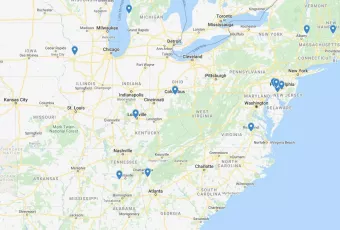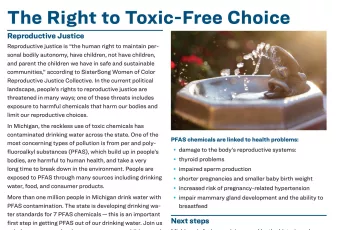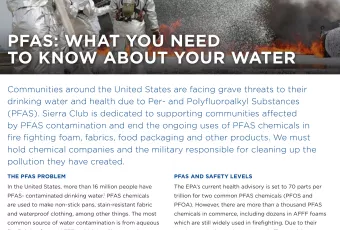Washington, DC -- Today, the Centers for Disease Control and Prevention (CDC) and the Agency for Toxic Substances and Disease Registry (ATSDR) announced that it will study eight military bases and adjacent communities where there was long-term…
Toxics & Health
Toxics & Health
We are working to address the widespread pollution of air, water, and the food supply. We recognize that the burden posed by toxic chemicals falls most heavily on marginalized people, including Black and Brown communities, low income families, and children. We are focused on actions that bring attention to people and places most impacted by pollution.
Despite legal protections that exist to regulate pesticides, the safeguards are woefully inadequate.
About Our Program
Polluters, not everyday people, must be responsible for halting the use of these chemicals, and paying to clean up the pollution and contamination they’ve created. Sierra Club is focused on actions that reduce environmental inequities. We call for long-lasting solutions, including stronger government oversight, pollution prevention, and increased corporate accountability.
Read More
Take Action
Our Initiatives
Reports & Resources
Press Releases
El Paso County, CO -- Today, the Centers for Disease Control and Prevention (CDC) and the Agency for Toxic Substances and Disease Registry (ATSDR) announced they will study eight military bases and adjacent communities where there was long-term…
Philadelphia, PA -- Today, Acting EPA Administrator Andrew Wheeler announced the EPA’s national action plan on PFAS. PFAS chemicals are widely detected in drinking water and toxic at very low levels. However they are currently exempted from most…
Tomorrow at 10:00 am at the Riverfront Community Center, the EPA Region 7 office is hosting a press conference in Leavenworth, Kansas where they will announce their PFAS national action plan.
In the first week of the legislative session, Rep. Carl Albrecht introduced HB 220 - Radioactive Waste Amendments, which provides for the disposal of higher classes of nuclear waste than is currently allowed by State law, including depleted uranium…


